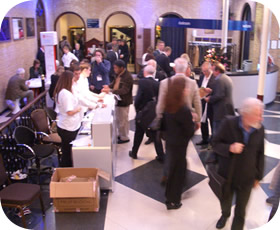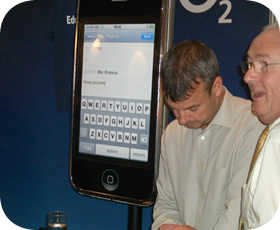Name Game: Handheld Learning 2008
Here's my review of Handheld Learning 2008, which took place in October in London.
 When delegates arrived at The Brewery in London for Handheld Learning 2008, they received a traditional conference bag containing the printed program and other paper materials. The bag also contained a Nintendo DS game since many received a DS when they registered. The interesting part wasn’t what was in the bag--it is what was not in it: a name badge.
When delegates arrived at The Brewery in London for Handheld Learning 2008, they received a traditional conference bag containing the printed program and other paper materials. The bag also contained a Nintendo DS game since many received a DS when they registered. The interesting part wasn’t what was in the bag--it is what was not in it: a name badge.
In his closing speech, conference organizer Graham Brown-Martin said that there were no name tags because everyone was important. Without name indicators, delegates would have to introduce each other, and it didn’t matter where they were from or what connection they had to mobile learning.
Out of the three Handheld Learning conferences I’ve been to, this one was the most interactive. Maybe that was because name badges were absent. Another reason the conference was so interactive was because of those Nintendo DSs. With so many delegates toting the gaming handheld, it was easy to fire up the built-in Pictochat. During sessions delegates shared text and pictures with others DS users in the room. It was fun to look around the room and try to figure out who was who from the Pictochat.
It’s unfortunate that there was no way to log the conversations and frivolity that took place in the DS Pictochat. Luckily, there was a way to archive the 140-characters-or-less updates that were posted online to Twitter. Twitter user GillClough noted, “Lively backchannel going on using DS pictochat. Shame we can't capture it.”
Many of the Twitter conversations can be found by clicking the archives on Handheld Learning’s page: http://twitter.com/hhl. The Twitter posts certainly showed variety. Delegates posted humorous musings, serious thoughts, fun ideas, and a few frustrations.
User johnwilkie voiced a problem many at Handheld Learning had. He wrote about keeping his devices charged. He wrote, “found an extremely rare 13A socket... juicing up the MacBook. Now I need a USB cable for my iPhone...” Having a powered learning tool is important, particularly because johnwilkie also wrote this quote he heard from Professor Stephen Heppell: “Every device turned off is a child turned off.”
Quotes and thoughts were a popular thing to share via Twitter. kathtrinder posted, “We have more work to do on assessment than we do on curriculum. Astute final comment from putnam.” jont posted, “Nice to hear people trying things and accepting they may fail.” I wrote “‘Viral Learning’... Infect a few students and it will spread to the others.”
Twitter user xlearn simply shared, “Hungry...” Every delegate I met was always hungry for learning, so I’m betting her purpose was to inform us she was craving food (which, for the record, Handheld Learning 2008’s lunch was full of delicious choices. At the two previous Handheld Learning conferences, l usually left lunch still hungry. Not this year).
Twitter was used to post links to resources. GianninaRossini posted each time she blogged live from a conference session. This was a great way to get others to her blog and interact in real time. I posted a link as reminder to delegates that they can search for Twitter posts from the conference using http://search.twitter.com. I also shared a link to the class site of the Learner’s Y Factor winners. The site, http://is.gd/46Hn, is an excellent example of using handheld devices to publish to the Web and to facilitate collaboration and cooperation.
 Besides sharing links, delegates shared feedback on presentations. I used Twitter to tell jamesclay, “Great visuals in your Pecha Kucha slide shows!” Admittedly, my favorite Twitter message of the whole conference was from LordLangley. After the conclusion of the conference, he wrote, “Sitting in St. Pancras Station drinking organic beer whilst feeling chuffed that he met Tony Vincent.” After I looked up the meaning of chuffed, his message made my day.
Besides sharing links, delegates shared feedback on presentations. I used Twitter to tell jamesclay, “Great visuals in your Pecha Kucha slide shows!” Admittedly, my favorite Twitter message of the whole conference was from LordLangley. After the conclusion of the conference, he wrote, “Sitting in St. Pancras Station drinking organic beer whilst feeling chuffed that he met Tony Vincent.” After I looked up the meaning of chuffed, his message made my day.
Like always, Handheld Learning had fantastic prizes. They were of course saved for the very end. Unfortunately, jamesclay wasn’t present for the prize drawings. He explained on Twitter, “Alas I am missing the end of hhl08 as I misread the end of the programme and had to catch the 16.30 train. No prizes for me then!”
A favorite occurrence was to the meet in person someone I followed on Twitter. Some people actually looked like their avatars and others did not. Without name badges, it was more of a chore to figure out who was who--but so rewarding as I met lots of people by asking.
Names of delegates wasn’t the only thing to figure out. Conference speakers made several references to what they have figured “Handheld Learning” to mean. I noted on Twitter that one speaker says that teachers “hold students’ hands” and guide their learning using technology. And like Handheld Learning 2006 and Handheld Learning 2007, delegates have suggested alternative names for the conference. This is what I wrote on Twitter while in a session about netbooks: “Handheld Learning could be renamed Hand-Over Learning because teachers become facilitators.” The speaker said this quote as she was explaining how teachers should be guiding learning and inspiring their students to take ownership of their learning.
Whether a delegate’s name, avatar, or screen name is one others were familiar with or not, each person at the conference had incredible ideas and thoughts about education. I’m glad that delegates who were not scheduled to speak in a formal session had opportunities to talk in front of groups. The Pecha Kucha game where anyone could speak for exactly 6 minutes and 40 seconds was a highlight for me. I liked the brevity of the presentations. I liked even more that the session was informal and as the three-hour session progressed, more delegates decided to participate and give a presentation.
Participation is how learning occurs. We often talk of how learning is not passive. Handheld Learning’s delegates weren’t called attendees because they were expected to do more than simply attend; they were expected to participate. They were called delegates since their function in the conference was active. Asking people their names, discussing issues in Pictochat, posting to Twitter, and making presentations were some of the ways that delegates were active participants. My problem with the conference: not enough coffee and power outlets to keep delegates and their technology active all day long.
You can view dozens of the presentations from Handheld Learning 2008 on the conference's Video and the Presentations pages.
